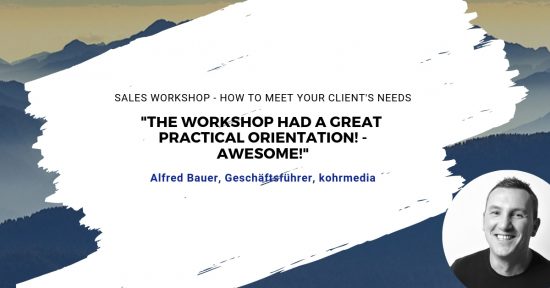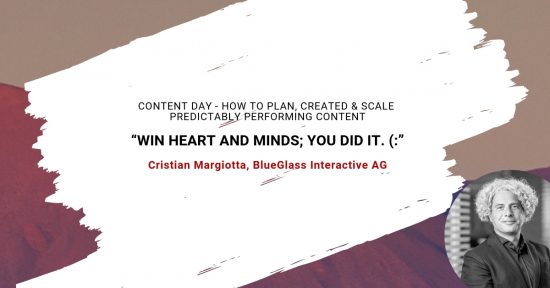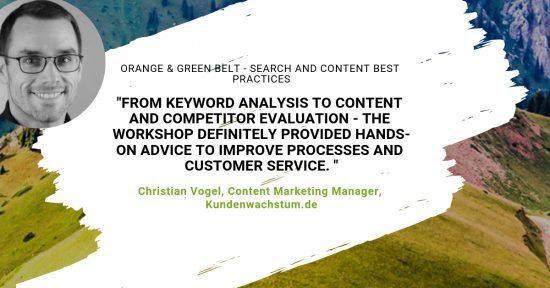Continuous learning, iterating and testing, as well as the ambition to keep up with the ever-changing world of digital marketing is what defines a true Digital Expert. To show our commitment to these goals and to encourage information sharing within the industry, we brought the Searchmetrics Digital Expert Week into being. Kicking off in and around our Berlin HQ, the Digital Expert Week was open to in-house and agency markters specializing in search and content marketing, and many followed the call.
In this article, we want to share a recap of the event and the most important outcomes of the Sales Workshop, the Content Day and the on-site Orange-, Green and Black Belt Certifications. If you missed this year’s event or simply can’t wait for the next, register for our ticket alert below, and you’ll receive a 20% discount for the Digital Expert Week 2019.
Sales Day – How to meet your client’s needs
Coaches: Christian Broscheit (VP Services & Sales EMEA), Stephan Jantz, (Director Sales Development EMEA), Philipp Weisswange (Account Executive)
The ability to offer great services and the ability to win new clients who will benefit from your great services often require very different skill-sets and communication methods. Therefore, Day 1 of the Digital Expert Week focused on the sales side of operations, where communicating the value of your product and services, and managing a potential client’s expectations, as well as those of various other involved stakeholders, is key.
What makes a B2B sales organization successful? In an intense workshop with 10 attendees from well-known agencies, we had a close look at structures and processes that have proven efficient, and we also discussed how to qualify and disqualify leads so that time and resscources can be efficiently invested on both sides.
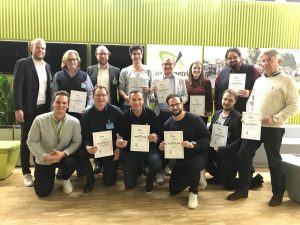
Successful Sales Techniques
In every sales process, there comes the time when objection handling is needed, and you’re constantly in danger of running into the “Shocking Objection Monster”. The attendees learned and practiced three different techniques which help to facilitate the day-to-day work.
- Scrutinize & understand: Every potential client has their own needs and goals. Understand what motivates them and pay attention to their current situation to work towards a tailored solution.
- Modify the conditions: We’re all gridlocked in our own ways. Enable your contact to evaluate their situation from different perspectives.
- Obtain commitment and offer solutions: Be clear and unambiguous. A successful provider-client relationship is based on shared expectations and common understanding.
Especially in a B2B environment, it is crucial to communicate – and sell – the value of the service or products as a whole, instead of trying to sell single features and/or resources. You have to adapt the communication to different stakeholders’ needs.
Best Practices:
- Create your pitch around a calculation based on a real life case and focus on highlighting the return on investment that your product or service will produce for your client. If possible, draw a diret comparison with your competitors’ offers or with different solutions that you might compete with in terms of budget.
- It’s important to deliver and explain deep insights for the specialists you are piching to. But it is equally important to present broader KPIs that managers and decision-makers are used to and that they are interested in.
- Create pitch dashboards that are easy to duplicate for different pitches, but adjust every dasboard to the needs and areas of responsibility of the person you are talking to.
Content Day – How to plan, create, measure & scale predictably performing content
Coaches: Michael Dziewior (Team Lead Content Services), Marlene Borst (Project Manager Digital), Katharina Lübke (Content Writer)
With the death of the keyword and the increasing importance of user signals and content factors, quality in content creation is at the heart of every successful digital marketing strategy. Therefore, Day 2 of the Searchmetrics Digital Expert Week aimed at leveraging the work of content marketers and enabling the participants to increase the visibility of their results and contribution to success. The workshop was structured into there stages, mirroring the approach the the Searchmetrics Digital Strategies Group takes when working with clients:
Content Audit
A detailed content audit serves as the basis of your content strategy and is essential for understanding which content is valuable for your target group, which content isn’t performing and, most importantly, where your content gaps and overlaps are. To conduct a content audit in a way that it enables you to make educated decisions, there are two components you should get straight before you start.
- The Data: Tools such as the Searchmetrics Suite and Content Experience, Deep Crawl or Google’s own analysis tools provide insights into the performance of your content and your audiences expectations and behavior.
- The Scope: Make sure that your plan includes both a qualitative and quantitative analysis and coveres a potential analysis, a structure analysis and a benchmark analysis.
Content Strategy
Within your content strategy, you define the roadmap and tactics of content creation, the goals that you set for your content and the KPIs which you use to measure whether you have achieved your goals or not. This applies to the content division itself, but also as an integrated part of your overall marketing strategy.
- Buyer Personas vs. Target Group: It’s neither as simple or as establised as one might think and we cannot repeat it ofter enough: Learn as much as you can about the hopes, needs, desires and interests of your target group and let these findings be the framework for your content strategy.
- Brand & Product Coherence: Your clients and potential clients will most likely see “the big picture”. So the more your content strategy conveys – and also shapes – your values and propositions, the more powerful it will be. Considering various aspects that come together to form your current company culture, the unique selling proposistions of your services and your products, will help to form your strategy, tonality and approach.
- Content along the Marketing Funnel: 80% of the user journey take place in the awareness and consideration stage, so a good amount of content should serve these stages as well. Find out if you are lacking informative or transactional content, and plan the production or adjustment of additional and existing pieces accordingly.
Content Creation
Content-Kreation sollte ein kontinuierlicher, iterativer Prozess sein und in den Händen von Experten liegen, um den größtmöglichen Mehrwert für ein Unternehmen zu bieten.
Content creation should be a continous, iterative process executed by professionals. And it needs to be measured and optimized just like every other marketing channel in your mix.
- Think online: Producing successful digital content doesn’t mean publishing former print content online. Tailor your content to your goals and ensure that you think carefully about the platforms and channels you provide your content on. Don’t forget: user behavior and reading strategies depend on environment and user intent.
- Think professionally: Content creation is a craft that requires professional content producers who know how to balance aesthetics and online performance. While storytelling and visual appeal need to be considered on the aesthetic side, implementing a neat text/URL strategy and focusing on proving expertise, authority and trust to the user and search enigne alike are as much part of the job.
- Think data-driven: Forget about keyword stuffing and bank on keyword clustering and the holistic coverage of your most important topics, while constantly measuring the results of your content in the context or your goals.
80% der #userjourney findet in der Awareness- und Consideration-Phase statt. #digitalexpertweek#day2pic.twitter.com/gXSNSCy83q
— Searchmetrics (@SearchmetricsDE) 27. November 2018
Best Practices
- Be informed! You can’t know where you’re going if you don’t know where you stand.
- Be there! Consider that 80% of the user journey takes place in the upper part of the sales funnel.
- Be right! Make sure your content supports the overarching marketing goals.
- Be useful! Create value for your audience and your company!
- Be holistic instead of hollow! Quality content is a combination of good and creative writing, and yet naturally including the keyword sets for an audience with a short attention span.
Orange & Green Belt – Searchmetrics Suite Best Practices
Coaches: Malte Landwehr (Director Product Marketing & Solutions), Nadine Caspers (Team Lead Client Success Management EMEA), Andre Krüger (Director Client Success Management EMEA)
To support the launch of the new Searchmetrics Suite, our Product Marketing and Client Success Management divisions teamed up to create a completely updated edition of our long-established Yellow Belt and Green Belt certifications. As if that wasn’t enough, the inaugral Searchmetrics Digital Expert Week came with another premiere: For the first time ever, we offered an Orange Belt Certification which allows our clients to have their content marketing expertise and Content Experience mastership certified.
As all courses are part of the online Searchmetrics Academy, we don’t want to leak any spoilers at this point, but the hard work and team spirit the attendees showed during the on-site certification were truly marvelous. (Hint: If you’re practising for the certification just now, you might want to carefully read the quote above).
Black Belt – The most advanced SEO certification
Coaches: Marcus Tober (Searchmetrics CTO & Founder) Björn Beth (Director Digital Strategies Group), Svetlana Stankovic (Team Lead Professional Services), Martin Gaulke (Senior SEO Consultant), Marcus Pentzek (Senior SEO Consultant)
The Searchmetrics Black Belt certification is our most advanced certification for a reason: Only true SEO Experts who have evidently succeeded in SEO strategy and execution are allowed to be part of the event. To kick off the 2-day certification, Searchmetrics CIO and founder Marcus Tober introduced several remarkable cases of how user intent can have a big influence on website rankings. The following session provided insights on how Google can identify user intent, and how important it is to not look at too general ranking factor correlation studies any longer, but to narrow your analysis down to as specific areas of interest as possible.
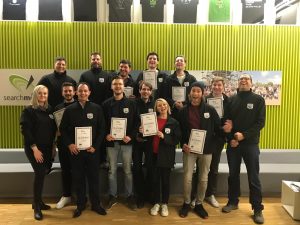 In further sessions during the two days of Black Belt Certification, we covered some of the issues that have been attracting the interest of SEOs and SEO clients during recent months, such as the E.A.T. Update – and how to recover if a site has lost visibility. Other topics that Black Belt aspirants had to prove their knowledge in were the switch to Mobile-First indexing – and the tactics positively affecting mobile-readiness, such as responsive webdesign (vs. seperate mobile website), mobile page-speed and HTTP/2.
In further sessions during the two days of Black Belt Certification, we covered some of the issues that have been attracting the interest of SEOs and SEO clients during recent months, such as the E.A.T. Update – and how to recover if a site has lost visibility. Other topics that Black Belt aspirants had to prove their knowledge in were the switch to Mobile-First indexing – and the tactics positively affecting mobile-readiness, such as responsive webdesign (vs. seperate mobile website), mobile page-speed and HTTP/2.
To conclude the test, the coaches and attendees discussed advanced real-world cases, including challenges the attendees are facing in their own businesses.
We’ll be back!
To conclude, we’d like to say a big thank you to all the attendees and once again congratulations to our new generation of Certified Professionals. With all the hard work and thrilling discussions about various approaches to successful SEO and content strategies and tactics, all certificates were truly deserved.
If you want to share your thoughts and feedback or have any suggestions for themes and topics for our upcoming workshops, please use the comment function below and don’t forget to sae your set for 2019!


